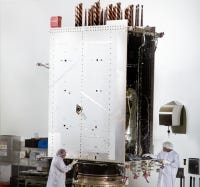House subcommittee members turn down $77 million request for small sats that were supposed to make GPS more resilient.
The U.S. House Appropriations defense subcommittee says they aren’t sold on the Space Force’s plan to use small GPS satellites, dubbed Resilient GPS (R-GPS), to increase resiliency. Before they recommended not to fund the $77 million that the Space Force requested in DoD’s fiscal 2025 budget request, the committee said that 20 small sats transmitting core GPS signals may not provide much signal resilience.
“The [c]ommittee has several concerns about the R-GPS plan and the use of this authority for this project. First, the R-GPS initiative purports to provide greater resilience by proliferating a constellation of about 20 small satellite transmitting core GPS signals,” the House committee said in a report that accompanied the bill. “While proliferation may provide some advantages, it is not clear how these additional satellites increase the resilience against the primary jamming threat to GPS, compared to alternate concepts for position, navigation, and timing systems being pursued elsewhere in the Department of Defense.”

The committee also said that the Space Force plan does not address issues with the lack of M-code GPS user equipment that enable jam-resistant capabilities. In addition, the committee said that DoD tried to dodge the congressional budget processes and bypass its own budget process to get the funds.
In February, the Space Force said it wanted to build the demonstration satellites to augment the existing 31 GPS satellite in orbit.
DoD estimated that the cost of the small sat constellation would rise to $1 billion over the next five years. The Space Force redirected $40 million in fiscal 2023 funding for the R-GPS initiative.



























